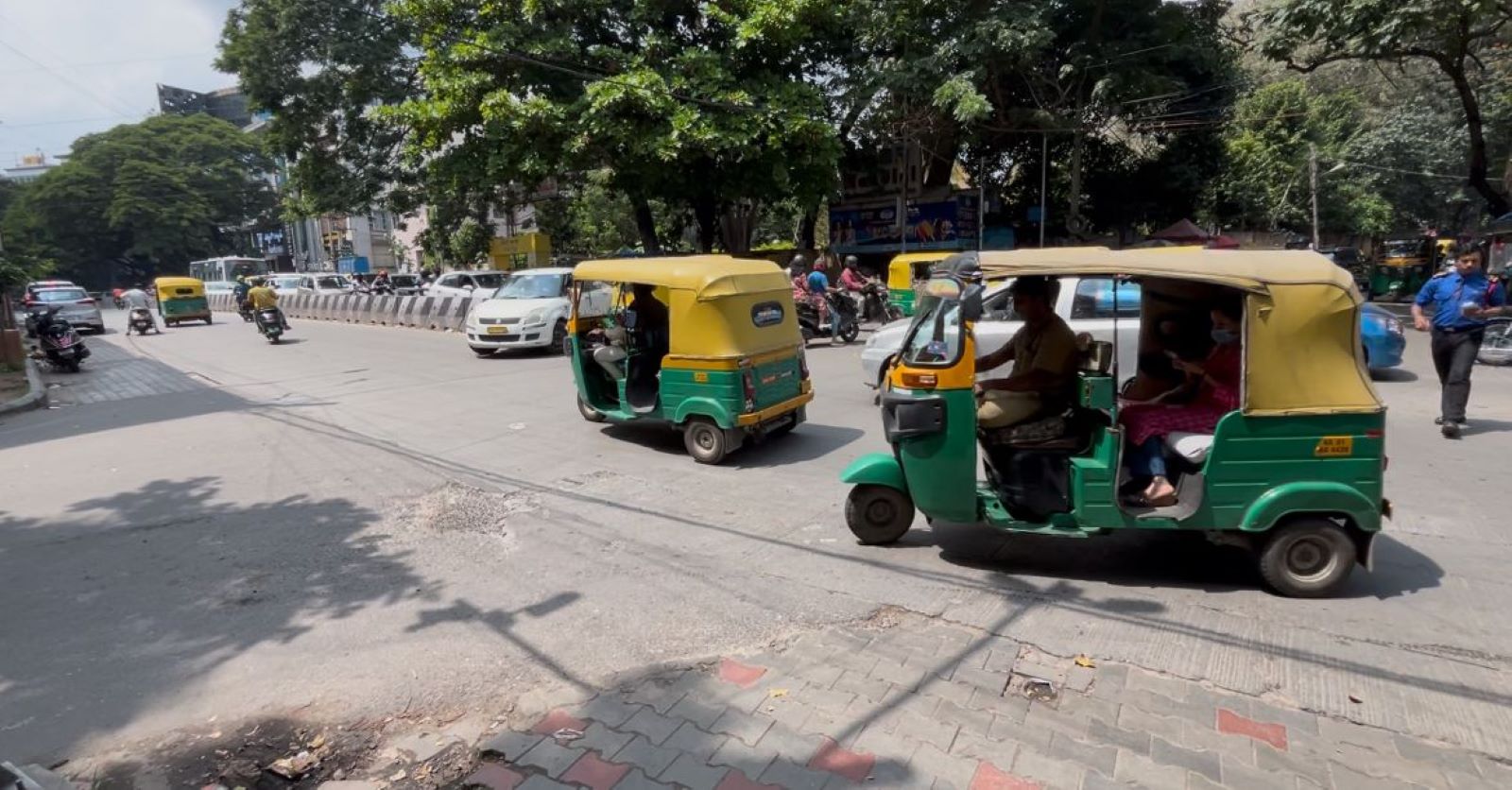Auto drivers and unions however, strongly opposed the hike, calling it "unilateral, unscientific, and against due process."
Published Aug 02, 2025 | 11:26 AM ⚊ Updated Aug 02, 2025 | 11:26 AM

Auto drivers and unions strongly opposed the hike. (South First)
Synopsis: Bengaluru auto fares rose 20 percent from 1 August after four years, sparking opposition from unions calling the hike unilateral and inadequate. New rates are ₹36 for 2 km and ₹18/km after. Drivers demand higher fares and annual revisions, with many refusing meter calibration.
After a gap of nearly four years, autorickshaw fares in Bengaluru have risen by 20 percent, from 1 August.
Auto drivers and unions however, strongly opposed the hike, calling it “unilateral, unscientific, and against due process.”
Auto unions like the Autorickshaw Drivers’ Union (ARDU), Adarsh Auto and Taxi Drivers’ Union have been demanding that the fare be raised to ₹40 for the first 2 km, and ₹20 for each additional kilometre.
According to the new rates, announced by the Bengaluru Urban district administration on 14 July, the minimum fare for the first two kilometres has been increased from ₹30 to ₹36. For every subsequent kilometre, passengers will now have to pay ₹18, up from the earlier ₹15. A night fare —applicable between 10 pm and 5 am— has also ben implemented, at 1.5 times the regular rate.
Manjunath L, member of Adarsh Auto Union, speaking with South First, said, “The hike was decided without consulting with us. Over the past four years, prices of autos and their spare parts have increased rapidly. The current CNG price too is around ₹89 a kg as opposed to ₹50 a couple of years ago. The fares haven’t been adjusted according to these rising operational costs.”
Despite the backlash, there was no disruption in auto services in Bengaluru on 1 August.
Karigowda, an auto driver near Kanakapura road told South First that the fare hike doesn’t make much of a difference to his income. He has not been using his meter; instead, he sets his own fare or relies on aggregator apps like Ola, Uber, and Rapido.
“I had to stop using the meter because I wasn’t getting any benefits. I switch to apps even though they charge me commission because I have to make my ends meet,” he said.
The cost of buying a new auto has also risen sharply – from around ₹1.85 lakh to ₹2.85 lakh – in recent years, he pointed out. “How can such a small fare increase help us cope with that?” he asked.
Drivers and unions have called for frequent or preferably annual fare revisions, arguing that such long gaps between revisions are unfair, given the rising cost of fuel, vehicle maintenance, and overall living expenses.
However, Transport Minister Ramalinga Reddy had earlier defended the revision, stating that the new rates are based on research and will not be revised further. A senior RTO official told Deccan Herald that failure to comply with the new fare requirements could affect drivers’ vehicle fitness certifications and permits.
An auto driver near Cubbon Park, who wanted to stay anonymous, refused to calibrate his meter in protest against the revised fares. “This is our way of pushing back. I will charge based on what the apps show,” he said. In fact, many auto drivers ask customers to check the price of a ride on an aggregator app and then match that price.
According to the Legal Metrology Department, autorickshaws in the city can operate without recalibrating their meters as per the revised fares until 31 October.
Manjunath added that his union members too will not calibrate their meters. “We will keep campaigning for our demands. We are hoping that we can meet with the Transport Minister in the next three months. And we will calibrate our meters only if he agrees to our demands,” he said.
ARDU too has been calling for consultations between unions and Deputy Commissioners. The union has written to the Bengaluru Urban Deputy Commissioner, pointing out what it claims are procedural lapses. “As per Rule 53 of the Karnataka Motor Vehicles Rules, the Deputy Commissioner is not the chairperson of the Regional Transport Authority (RTA). Despite this, he has issued the order unilaterally. This is not acceptable,” the letter stated.
Meanwhile, waiting charges, too, have been revised, with the first five minutes remaining free. After that, a fee of ₹10 will be charged for every 15 minutes of waiting. In terms of baggage, up to 20 kg is allowed for free. An additional ₹10 will be charged for every 20 kg or less. The maximum baggage allowed is 50 kg.
Aggregator platforms like Ola, Rapido, and Uber are also expected to incorporate the revised fare structures in the coming days.
Namma Yatri has already begun displaying a detailed fare breakdown based on the updated rates. However, many auto drivers still favour the prices listed on these platforms over the newly revised official fares.
“The apps also include additional components such as pickup charges and driver fees, which ultimately bring the total fare close to what we had been asking for,” said Karigowda.
(Edited by Sumavarsha)
